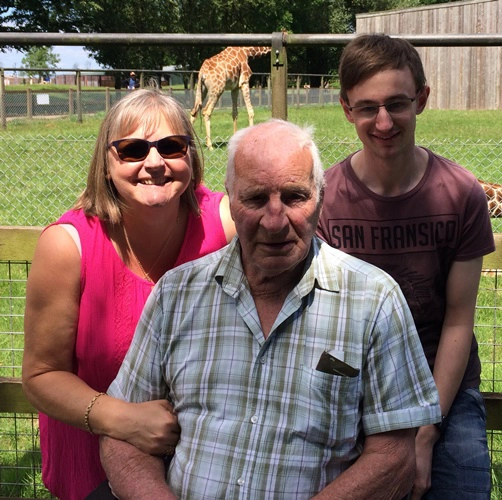
Susan Thorp and her partner Ron had been together for more than 30 years when he was diagnosed with vascular dementia in February this year.
As his mobility deteriorated and he became increasingly dependent on her, help and support came from various health professionals who often gave different and conflicting advice, leaving Susan feeling frustrated and confused.
When The Hospice of St Francis stepped in, she finally felt she had someone who could pull all that advice together and help her sort through the muddle.
Here she tells her story:
“When we were first referred to The Hospice of St Francis by our GP I was taken aback because I didn’t think we needed a hospice. To me hospices were places that you went to die. I wasn’t aware of all the support they give to people in the community.
Ron’s health started to deteriorate a couple of years ago. Heart failure and lung fibrosis prevented oxygen reaching his brain properly and in February this year he was diagnosed with vascular dementia. It began to affect his mobility and he could no longer move his legs properly. Gradually, he began to deteriorate mentally.
As soon as the Hospice came on board to support me with Ron’s care it was like finally having a safety net. Before that the help we were getting was very disjointed and I felt very much on my own. We had district nurses, occupational therapists, physiotherapists, holistic nurses, you name it they were all coming in and telling me what was best for Ron. While they were very well-meaning, they were all telling me different things.
The biggest thing the Hospice did for me was pull together all that advice under one umbrella and help me sort through the muddle. Having one person to rely on who knows the system and knows how to handle it all was life-changing. It was like finally having a safety net knowing that if I was unsure about anything there was always someone there to rely on.
When Sue Higgins, one of the Hospice community nurses came to see us, she asked a few questions and took everything in and immediately said ‘you need a hospital bed in your house’. Until then, I didn’t know that was even possible.
Within a week we’d got a hospice bed – and it changed my life! Trying to get Ron washed and dressed in an ordinary bed had been incredibly difficult. All of a sudden I had a bed that came up to waist height and that made all the difference.
The Hospice really opened up the world of caring for me. Before they came along I didn’t know what I needed as I didn’t know what was available. Sue made sure we were registered with the district nurse, arranged for me to have a home carers’ assessment and made sure I was accessing all the benefits we were entitled to. I was amazed by how quickly everything was sorted out. Within two or three weeks everything that I previously didn’t know I needed was in place.
Sue had suggested that I get carers to come in to help me look after Ron but being 30 years younger than him, I thought I was young enough to cope and caring for Ron was something I wanted to do myself. However, just before Easter 2018, Ron was admitted to hospital for two weeks with a bad infection. The infection had made him delirious but somehow in the middle of the night he’d managed to get out of bed, walk to the kitchen, fall over and knock himself out. Sue said he shouldn’t come home until we had a proper care package in place.
She reassured me that I wasn’t failing Ron if I needed help with the 24/7 care that Ron required. I had felt that if I asked for help I was somehow letting him down but the hospice team helped me see that it’s not failing to ask for help and reassured me that I would still have control over Ron’s care.
I had been doing everything myself, which meant it was difficult for me to leave the house for even 10 minutes. Ron was also very unsettled and agitated at night, so I wasn’t getting much sleep.
Our son Matthew, who is 22, lives at home and he would help if he could but as he works full time he wasn’t there during the day and I wanted to keep his life as normal as possible. We are a great support for each other and often laugh together, sometimes at the most inappropriate things, but it helps to be able to laugh.
The Hospice has also been a great support for me. It was hard to watch Ron deteriorate, but the support I had from the Hospice helped me cope. It was reassuring to know that they were always there if I needed to talk to someone and that I could phone at any time. I knew that if I called and they were not there, they would quickly call back or if I had a question they didn’t know the answer to they would find out.
Lisa Venables, one of the Hospice healthcare assistants, came to see me every couple of weeks. It was an opportunity for me to talk through any concerns. We even talked about the signs to look for that Ron was close to the end. It helped me to have some kind of plan – I felt I could cope better.
With all the support we got from the Hospice, I never got the sense of being rushed and they always gave me the time that I needed. It’s like being wrapped in a safety blanket. Although they were not there in the house with me all the time, I knew they would be there if I needed them.
Before Ron died I took part in the Hospice’s Practical Caring and Care Towards the End of Life courses. You can pick up hints and tips that can be life-changing. I found out about Wendy Letts sheets, which make it easier to move someone in bed. That was a revelation!
However, the biggest benefit for me was that it gave me the chance to come together with other people in a similar situation who know what it’s like to care for someone else. It can be very lonely at times when you’re trying to calm someone down in the middle of the night but to know that there are other people out there doing the same thing is invaluable.
I quickly came to realise that the Hospice is far more than just a place to die. There is so much more they can do for you.”






Share Article